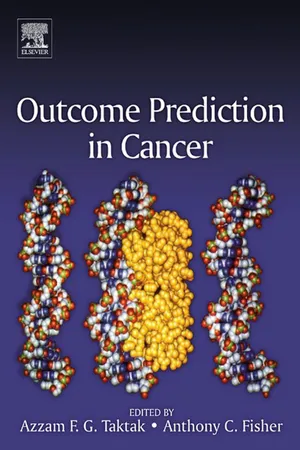
- 482 pages
- English
- ePUB (mobile friendly)
- Available on iOS & Android
Outcome Prediction in Cancer
About this book
This book is organized into 4 sections, each looking at the question of outcome prediction in cancer from a different angle. The first section describes the clinical problem and some of the predicaments that clinicians face in dealing with cancer. Amongst issues discussed in this section are the TNM staging, accepted methods for survival analysis and competing risks. The second section describes the biological and genetic markers and the rôle of bioinformatics. Understanding of the genetic and environmental basis of cancers will help in identifying high-risk populations and developing effective prevention and early detection strategies. The third section provides technical details of mathematical analysis behind survival prediction backed up by examples from various types of cancers. The fourth section describes a number of machine learning methods which have been applied to decision support in cancer. The final section describes how information is shared within the scientific and medical communities and with the general population using information technology and the World Wide Web.* Applications cover 8 types of cancer including brain, eye, mouth, head and neck, breast, lungs, colon and prostate* Include contributions from authors in 5 different disciplines* Provides a valuable educational tool for medical informatics
Frequently asked questions
- Essential is ideal for learners and professionals who enjoy exploring a wide range of subjects. Access the Essential Library with 800,000+ trusted titles and best-sellers across business, personal growth, and the humanities. Includes unlimited reading time and Standard Read Aloud voice.
- Complete: Perfect for advanced learners and researchers needing full, unrestricted access. Unlock 1.4M+ books across hundreds of subjects, including academic and specialized titles. The Complete Plan also includes advanced features like Premium Read Aloud and Research Assistant.
Please note we cannot support devices running on iOS 13 and Android 7 or earlier. Learn more about using the app.
Information
Table of contents
- Cover image
- Title page
- Table of Contents
- Foreword
- Contributors
- Introduction
- Section 1: The clinical problem
- Section 2: Biological and Genetic Factors
- Section 3: Mathematical Background of Prognostic Models
- Section 4: Application of Machine Learning Methods
- Section 5: Dissemination of Information
- Subject Index